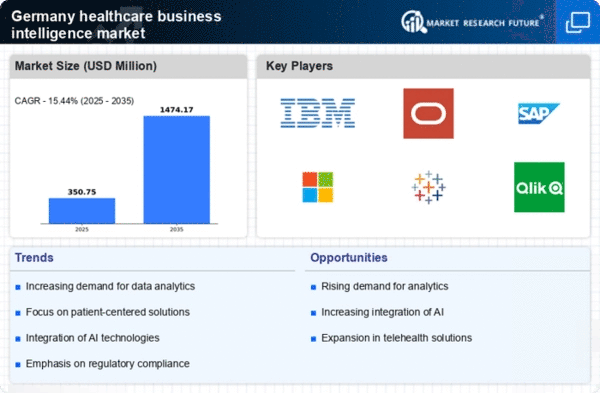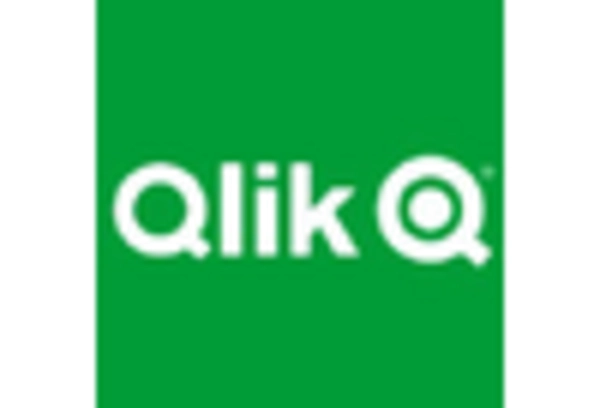Rising Demand for Data Analytics
The healthcare business-intelligence market in Germany experiences a notable surge in demand for data analytics solutions. This trend is driven by healthcare providers seeking to enhance operational efficiency and improve patient outcomes. With the increasing volume of healthcare data generated, organizations are compelled to adopt advanced analytics tools to derive actionable insights. According to recent estimates, the market for data analytics in healthcare is projected to grow at a CAGR of approximately 25% over the next five years. This growth reflects a broader shift towards data-driven strategies, where healthcare institutions leverage analytics to optimize resource allocation and streamline processes. Consequently, the healthcare business-intelligence market is positioned to benefit significantly from this rising demand, as stakeholders prioritize data analytics to navigate the complexities of modern healthcare.
Integration of Interoperable Systems
The healthcare business-intelligence market in Germany is witnessing a critical driver in the form of interoperability among healthcare systems. As healthcare providers increasingly recognize the importance of seamless data exchange, the demand for interoperable solutions is on the rise. This integration facilitates the sharing of patient information across various platforms, enhancing care coordination and improving clinical decision-making. The German government has initiated several programs aimed at promoting interoperability, which is expected to bolster the healthcare business-intelligence market. By 2026, it is anticipated that over 70% of healthcare organizations will adopt interoperable systems, thereby creating a more connected healthcare ecosystem. This shift not only enhances patient care but also empowers healthcare professionals with comprehensive data insights, ultimately driving the growth of the healthcare business-intelligence market.
Emphasis on Cost Reduction Strategies
Cost containment remains a pivotal concern within the healthcare sector in Germany, significantly influencing the healthcare business-intelligence market. As healthcare organizations strive to manage rising operational costs, there is an increasing focus on implementing business-intelligence solutions that facilitate cost reduction. By utilizing data analytics, healthcare providers can identify inefficiencies, optimize supply chain management, and enhance resource utilization. Reports indicate that organizations leveraging business-intelligence tools can achieve cost savings of up to 15% annually. This emphasis on cost reduction not only supports the financial sustainability of healthcare institutions but also drives the adoption of innovative solutions within the healthcare business-intelligence market. As a result, stakeholders are likely to invest in technologies that provide insights into cost management and operational efficiency.
Growing Importance of Patient-Centric Care
The shift towards patient-centric care is reshaping the landscape of the healthcare business-intelligence market in Germany. Healthcare providers are increasingly focusing on delivering personalized care experiences, which necessitates the use of advanced business-intelligence tools. These tools enable organizations to analyze patient data, preferences, and outcomes, thereby facilitating tailored treatment plans. The emphasis on patient engagement and satisfaction is expected to drive the adoption of business-intelligence solutions that enhance communication and collaboration between patients and providers. As a result, the healthcare business-intelligence market is likely to expand, with stakeholders investing in technologies that support patient-centric initiatives. By 2027, it is projected that patient-centric solutions will account for over 30% of the overall healthcare business-intelligence market.
Advancements in Cloud Computing Technologies
The healthcare business-intelligence market in Germany is significantly influenced by advancements in cloud computing technologies. The shift towards cloud-based solutions offers healthcare organizations enhanced flexibility, scalability, and cost-effectiveness. As more providers migrate to cloud platforms, the demand for business-intelligence tools that operate seamlessly in the cloud is expected to rise. This transition allows for real-time data access and collaboration among healthcare professionals, ultimately improving decision-making processes. Current estimates suggest that the cloud computing segment within the healthcare business-intelligence market could grow by over 20% annually. This growth is indicative of the increasing reliance on cloud technologies to support data analytics and business intelligence initiatives, positioning the market for substantial expansion in the coming years.
















